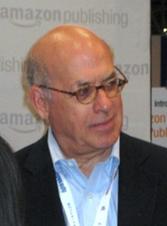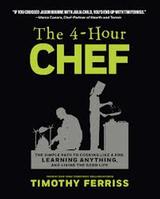 Big news concerning Amazon's attempt to become a major force in U.S. book publishing: Shelf Awareness has learned that Larry Kirshbaum, editorial head of the company's New York and Seattle adult imprints and children's publishing, is leaving the company early next year and returning to agenting. In connection with his departure, the most ambitious part of Amazon's publishing operations will be scaled back. Already several editorial people have left or been let go, and Amazon has not been a factor in bidding on major books the way it had been just two years ago.
Big news concerning Amazon's attempt to become a major force in U.S. book publishing: Shelf Awareness has learned that Larry Kirshbaum, editorial head of the company's New York and Seattle adult imprints and children's publishing, is leaving the company early next year and returning to agenting. In connection with his departure, the most ambitious part of Amazon's publishing operations will be scaled back. Already several editorial people have left or been let go, and Amazon has not been a factor in bidding on major books the way it had been just two years ago.
Amazon will continue with its more specialized publishing imprints, such as Thomas & Mercer, which publishes mysteries and thrillers, the sci-fi and fantasy imprint 47North and Montlake Romance.![]() Amazon's general trade New York publishing operation started with a splash: in May 2011, on the eve of BookExpo America, Amazon announced it had hired Kirshbaum, a literary agent and former head of Time Warner Book Group, to lead a unit that would acquire major titles, pay large advances and compete with the big New York houses.
Amazon's general trade New York publishing operation started with a splash: in May 2011, on the eve of BookExpo America, Amazon announced it had hired Kirshbaum, a literary agent and former head of Time Warner Book Group, to lead a unit that would acquire major titles, pay large advances and compete with the big New York houses.
Publishers were none too happy, but more important, the negative reaction of bricks-and-mortar stores played a significant role in the publishing unit's destiny. Barnes & Noble said it would not stock titles published by archrival Amazon, and most indies said they would follow a similar policy, although a few said they would stock titles unenthusiastically and many said they would special order such titles for customers who requested them. Most said they didn't want to help a ruthless competitor and pointed out that many of the big-name authors that Amazon hoped to sign owed some of their success to bricks-and-mortar booksellers. The first major Amazon titles to hit the market were My Mother Was Nuts by Penny Marshall, the film director, producer and actress, which appeared in September 2012, and The 4-Hour Chef: The Simple Path to Cooking Like a Pro, Learning Anything, and Living the Good Life by Timothy Ferriss, released in November 2012. Sales of Marshall's book were tepid for such a celebrity, and while Ferriss's book, bought for seven figures, did better, there were signs that the stand by B&N and most indies was having an effect--even if some observers thought they were being naive for not following "the wave of the future." (Besides chain and most indie booksellers, even Wal-Mart and Target declined to stock The 4-Hour Chef in-store.) Having some Amazon titles published in print versions by Houghton Mifflin Harcourt under the New Harvest imprint also did not help these big-name titles.
The first major Amazon titles to hit the market were My Mother Was Nuts by Penny Marshall, the film director, producer and actress, which appeared in September 2012, and The 4-Hour Chef: The Simple Path to Cooking Like a Pro, Learning Anything, and Living the Good Life by Timothy Ferriss, released in November 2012. Sales of Marshall's book were tepid for such a celebrity, and while Ferriss's book, bought for seven figures, did better, there were signs that the stand by B&N and most indies was having an effect--even if some observers thought they were being naive for not following "the wave of the future." (Besides chain and most indie booksellers, even Wal-Mart and Target declined to stock The 4-Hour Chef in-store.) Having some Amazon titles published in print versions by Houghton Mifflin Harcourt under the New Harvest imprint also did not help these big-name titles.
Ferriss himself recognized that his book was a major test for Amazon. At the time The 4-Hour Chef was published, he told USA Today: "This is a very important launch for Amazon Publishing and for me personally. There are a dozen A-list authors who are watching to see if they should call Amazon Publishing."
Not long afterward, as bricks-and-mortar stores held the line, Ferriss commented to the New York Times: "By signing with Amazon, I expected this type of blowback. I've been girding my loins." He also noted a problem of what was essentially an Amazon-only marketing approach: made for browsing, he said, The 4-Hour Chef "is the kind of book that physical booksellers would be most excited to sell." Others noted that besides the loss of sales, the stand by bricks-and-mortar stores precluded a major delight for authors--seeing their books in bookstores.
Last fall, Forrester technology analyst Sucharita Mulpuru spoke presciently of Amazon Publishing's ambitious plans: "I had expected more. I expected them to find the next Hunger Games. I expected the next Harry Potter to come through Amazon. They have not changed the world like many assumed they would." --John Mutter

